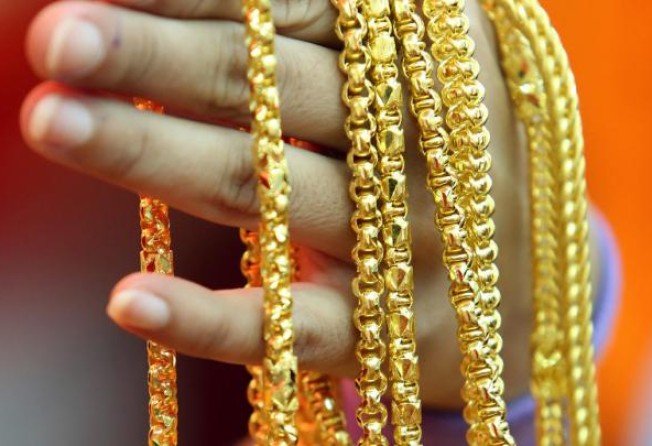Mainland Chinese shoppers invest billions in gold
Drop in price of precious metal sparks investor sell-off but attracts buyers from mainland

The scene at each of the four Chow Tai Fook stores dotting Causeway Bay's Hennessy Road was the same: a rush of buyers snapping up jewellery, coins and other gold items.
Gold investors elsewhere around the world were dumping the precious metal last week as it saw the sharpest price drop in three decades. However, buyers in Hong Kong, particularly those from the mainland see value - they have been swooping on Hong Kong jewellery shops to buy at what they perceive are bargain prices.
A woman from Zhejiang braved the rain to scurry between several jewellery chain stores within a stone's throw of each other. She was in the market for gold necklaces and bracelets, which she plans to give to her daughter when she marries.
"I booked my trip to Hong Kong in January but the timing is good," she says. "Dowry is something you know you will need and I don't think there'll be an opportunity like this for a long time."
Wang Kai, a visitor from Shenyang who bought HK$68,000 worth of gold products during his three-day stay in the city, said: "I missed out the last time gold was low so I know I have to buy some. It's just a little bit of investment to balance out other things."
Haywood Cheung, the president of the Chinese Gold & Silver Exchange Society, said gold sales in Hong Kong got a big boost over the past week.
"We were doing about HK$80 billion in sales but on Friday it moved to HK$100 billion, and by Monday, it was tremendous - it went up to HK$150 billion. On the bullion side, we sold out on the weekend - one tonne of gold bars. It's quite rare for weekend sales," said Cheung.
Investing in gold has long been popular with the elderly, but Cheung says he saw more young men buying during this price dip.
"They are coming to realise that gold is more of a safe haven because the past couple of years, markets have declined so much," he says.
The gold chains sold in Hong Kong jewellery shops are essentially gold vehicles, for investment. They are high purity and are sold according to their weight as per the daily quote for gold.
But why are mainland shoppers so focused on the physical investment - jewellery and ingots - when there are more efficient ways to invest? For example, investors can buy gold exchange traded funds (such as the SPDR Gold Shares or iShares Gold Trust), or shares in gold mining firms, which are essentially a leveraged bet on gold price appreciation. These instruments are easy to buy and trade, and efficiently track the price of gold.
By comparison, heavy gold jewellery - or jewellery whose value is largely determined by the bullion content - will trade at a 5 to 10 per cent spread, estimates Martin Hennecke, an associate director of Tyche Group, a financial adviser. This means that any time someone sells their gold jewellery, they are taking up to a 10 per cent loss on the trade.
Hennecke thinks mainland shoppers want physical gold because they, like many other investors, lack faith in paper investments - gold ETFs, certificates or mining shares.
He says research from the World Gold Council, an industry body, shows there is 78 times more "paper gold" (ETFs, certificates and the like) than actual physical gold.
"Most of the Chinese are not so stupid as to trust an ETF," he says.
On a side note, some ETF managers have addressed this concern by arranging for a real-time video feed of vaults holding the gold linked to the fund, so investors can have confidence actual gold back their fund.
That aside, Hennecke says physical gold makes most sense, he says, but he advises buying gold bars in a bank, where the buy-sell spread is much tighter, at 0.13 per cent.
This story was updated on April 23 to correct, in the 2nd paragraph, from “….dropped to its lowest price in three decades” to "... saw the sharpest price drop in three decades."